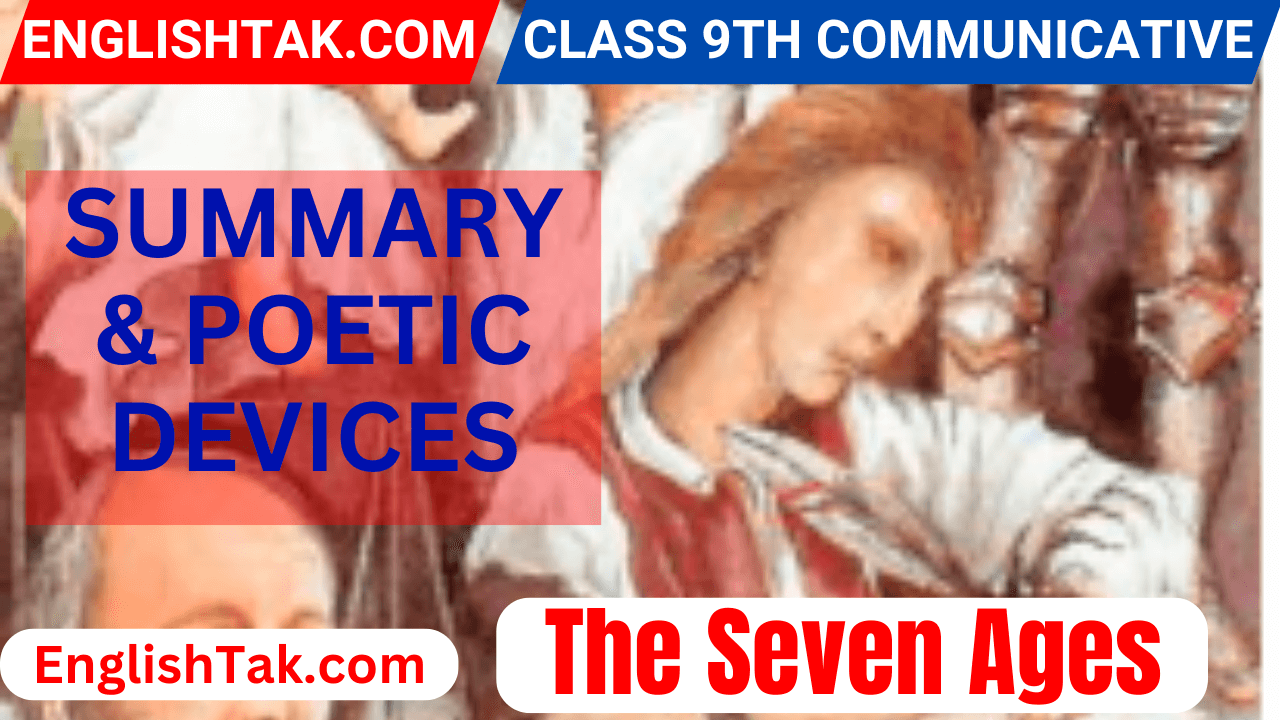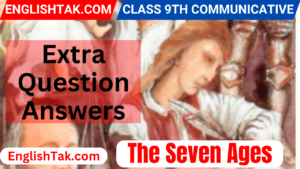![]()
Summary of The Seven Ages
The Seven Ages Summary – In this poem, the poet talks about a man’s life and its different stages, which he calls the ‘Seven Ages.’ He compares life to a play. Just like actors in a play come on stage and perform their roles, the poet says that a man comes into the world when he is born, plays seven different roles during his life, and then leaves the world when he dies.
The Seven Ages Summary
Lines 1-5: The World as a Stage
Shakespeare begins by comparing the world to a stage where every man and woman is an actor. These “actors” have entrances (birth) and exits (death) and, during their lives, they play many roles. A man’s life can be divided into seven distinct parts or “acts.”
First Stage – The Infant:
In the first stage, a person is a helpless baby, crying (“mewling”) and vomiting (“puking”) in the arms of a nurse or caretaker. This stage represents complete dependence on others.
Second Stage – The Schoolboy:
In the second stage, the child grows into a schoolboy. He carries his school bag (“satchel”) and has a fresh and innocent look (“shining morning face”). However, he is reluctant to go to school, dragging his feet and moving slowly, like a snail.
Third Stage – The Lover: The Seven Ages Summary
The third stage is that of a passionate young lover. He is full of intense emotions and sighs (“sighing like a furnace”). He writes sad love poems (“woeful ballad”) for his beloved, focusing even on small details like her eyebrows.
Fourth Stage – The Soldier:
In the fourth stage, the man becomes a brave soldier, full of energy and strange promises (“oaths”). He has a fierce look, with a beard like a leopard (“pard”). The soldier seeks honor and reputation (“bubble reputation”), even if it means facing dangerous situations like going into battle.
Fifth Stage – The Justice:
In the fifth stage, the man matures into a wise judge or justice. He becomes heavier (“round belly”) and enjoys eating delicacies like well-fed chicken (“good capon lined”). His eyes are serious, and his beard is neatly trimmed. He gives advice and shares wisdom through proverbs (“wise saws”) and modern examples (“modern instances”).
Sixth Stage – The Pantaloon:
In the sixth stage, the man becomes old and weak, resembling a foolish old man (“pantaloon”). He wears glasses (“spectacles”) and carries a pouch at his side. His once well-fitting clothes now seem too big for his thin legs (“shrunk shank”). His deep voice weakens, sounding more like the high-pitched voice of a child.
Seventh Stage – Second Childishness and Oblivion:
In the final stage of life, the man returns to a childlike state. He loses his teeth, eyesight, and taste (“sans teeth, sans eyes, sans taste”). He forgets everything and becomes completely dependent on others once again, eventually fading into oblivion (“sans everything”).
The Seven Ages Poetic Devices (The Seven Ages Summary)
In “The Seven Ages” by William Shakespeare, several poetic devices are used to enhance the imagery and themes of the poem. Below are the key poetic devices:
1. Metaphor:
All the world’s a stage – The world is compared to a stage, and people are compared to actors. This is the central metaphor of the poem.
Bubble reputation – Reputation is compared to a fragile bubble, indicating how temporary and easily shattered it is.
2. Simile:
Creeping like snail – The schoolboy is compared to a slow-moving snail, showing his reluctance to go to school.
Sighing like furnace – The lover’s heavy sighs are compared to the heat of a furnace, emphasizing his intense emotions.
3. Alliteration:
Shrunk shank – The repetition of the ‘sh’ sound creates a rhythmic effect, describing the old man’s thin legs.
Plays his part – The repetition of the ‘p’ sound adds a musical quality to the line.
4. Imagery:
Shining morning face – Visual imagery of a young schoolboy’s fresh, innocent appearance.
Cannon’s mouth – A vivid image of the soldier facing extreme danger, symbolizing bravery.
5. Personification:
Mewling and puking – Infancy is personified with human actions like crying and vomiting, giving life to the stage of infancy.
6. Repetition:
Sans teeth, sans eyes, sans taste, sans everything – The repetition of “sans” (without) emphasizes the complete loss of faculties in the final stage of life.
7. Hyperbole:
Sighing like furnace – This exaggeration emphasizes the depth of the lover’s emotional state.
8. Irony:
Seeking the bubble reputation / Even in the cannon’s mouth – The irony lies in how people risk their lives for something as fragile as reputation, which can vanish in an instant.
9. Symbolism:
Seven Ages – Each stage of life symbolizes a different phase of human existence, from infancy to old age.
Second childishness – Old age is symbolized as a return to a childlike state of helplessness.
The Seven Ages Difficult Words Meanings:
1. Stage – A platform for performing, symbolizing life. (मंच)
2. Players – Actors, symbolizing people playing roles in life. (कलाकार)
3. Exits – Departures, symbolizing death. (निकास)
4. Entrances – Beginnings, symbolizing birth. (प्रवेश)
5. Mewling – Crying softly, like a baby. (बिलबिलाना)
6. Puking – Vomiting. (उल्टी करना)
7. Satchel – A small bag, especially for schoolboys. (थैला)
8. Sighing – Breathing out heavily, often due to emotion. (आह भरना)
9. Furnace – A device for heating, here symbolizing intense passion. (भट्टी)
10. Woeful – Full of sorrow. (दुःख भरा)
11. Ballad – A song or poem narrating a story, often of love or sorrow. (गीत)
12. Pard – A leopard, symbolizing fierceness. (तेंदुआ)
13. Oaths – Strong promises or declarations. (शपथ)
14. Bubble reputation – A temporary, fragile sense of honor or fame. (क्षणिक प्रतिष्ठा)
15. Cannon’s mouth – The front of a cannon, symbolizing extreme danger. (तोप का मुंह)
16. Capon – A castrated rooster, symbolizing a well-cooked delicacy. (बंधा हुआ मुर्गा)
17. Saw – A proverb or wise saying. (कहावत)
18. Instances – Examples. (उदाहरण)
19. Pantaloon – A foolish old man, a stock character from comedy. (बूढ़ा मूर्ख आदमी)
20. Shrunk – Reduced in size. (सिकुड़ा हुआ)
21. Treble – High-pitched voice. (उच्च स्वर)
22. Oblivion – The state of being forgotten. (विस्मृति)
23. Sans – Without (French origin). (बिना)
English For CBSE Class 9 Communicative
A Dog Named Duke Extra Questions Answers
The Solitary Reaper Summary and Theme
How I Taught My Grandmother to Read Extra Question Answers
The Brook Summary in English and Hindi
Keeping It From Harold Summary
The Man Who Knew too Much Summary
A Dog Named Duke Summary in English
How I Taught My Grandmother to Read Summary





